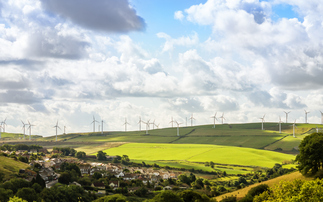Despite Friday's horrific attacks, Obama and other world leaders will attend talks in France, as Republicans in Congress continue to fight Obama's climate plan
The point person behind Barack Obama's environmental agenda has declared Americans are fed up with climate change denial and other efforts to wreck a Paris summit to stop global warming.
Despite Friday's horrific attacks, Obama and other world leaders still plan to travel to Paris on 30 November for the start of two weeks of talks aimed at securing a global agreement to reduce climate pollution.
Republicans in Congress could vote as early as Tuesday to repeal the main pillar of Obama's climate plan - which would send the message to Paris that the president faces strong opposition to his agenda.
Republican leaders, including James Inhofe of Oklahoma - who notoriously once threw a snowball in the Senate in an attempt to disprove climate change - are also planning to travel to Paris to register their opposition to a global climate deal.
But Gina McCarthy, who heads the Environmental Protection Agency, said she believed the Paris meeting would hasten the US shift away from fossil fuels such as coal, oil and gas towards clean energy sources - and that the American public would not tolerate Republican and industry efforts to stand in the way of this.
"The world is just changing," McCarthy told the Guardian in an interview. "People frankly I don't think will tolerate a return to business as usual and climate denial and thinking that power plants that are 60 to 80 years old are actually the future we want to build for our country."
Republicans in Congress have threatened to overturn the main pillar of Obama's climate change plan: rules cutting greenhouse gas emissions from power plants that were written and are being implemented by McCarthy's EPA.
Mitch McConnell, the Republican Senate majority leader, last month called the rules "a crusade for ideological purity".
The rules seek a 30 per cent cut from 2005 levels by 2030 in greenhouse gas emissions from power plants, the single largest source of climate pollution.
The EPA rules also face a legal onslaught, with two dozen states suing to block the agency from acting to stop climate change.
The congressional votes - whose timing remained uncertain following the Paris attacks - would resort to a rarely used measure to repeal the EPA regulations.
The Senate could move votes as early as this week in order to register Congress's disapproval of the EPA rules before Obama leaves for Paris.
At least two Democratic senators, Joe Manchin of West Virginia and Heidi Heitkamp of North Dakota, are expected to join Republicans in voting against the EPA rules.
The White House has said Obama would veto any such measures. It does not appear Republicans have the votes to overturn a presidential veto.
Meanwhile, Inhofe is expected to use his position as chair of the Senate's environment and public works committee to investigate what Republicans call the "empty promises" of Obama's efforts to get a climate change treaty during a hearing on Wednesday.
The political theatrics give Republicans a chance to try to undermine Obama's claims to global leadership on climate change. Though now surpassed by China, the US has historically been the biggest emitter of greenhouse gas emissions.
In his second term in the White House, Obama has pushed hard at home and abroad for action on climate change.
In the run-up to the Paris meeting, Obama agreed on joint action with China to cut greenhouse gas emissions, and reached other climate agreements with big emitters such as Brazil and India.
But Republican opponents are trying to shake international confidence in Obama's ability to deliver on his climate commitments at home - and thwart the prospects of a global climate deal.
Todd Stern, the State Department's climate change envoy, said the Republican pushback against the Obama agenda and the EPA rules had had no effect on the preparations for the Paris conference. "I don't see a lot of anxiety about that," he told a conference call with reporters.
"It is standard operating procedure in the history of environmental regulation in the United States that when the EPA lays down an important regulation, it gets attacked," Stern said. "It's never not happened."
A majority of Republicans in Congress deny climate change is a result of human activity or oppose measures to limit greenhouse gas emissions.
But McCarthy argued that the Republican line left elected officials increasingly at odds with the American public, who were seeing real-time evidence of climate change in record temperatures and extreme weather events.
"I think their ideas are quite endangered," the EPA administrator said.
The American public was also eager to see a strong climate deal emerge from the Paris negotiations, she went on. "I think that because of the president's leadership and visibility the appetite of the American people has changed significantly," McCarthy said. "They don't want us to sit on our hands."
McCarthy said she was also confident that the EPA rules were on solid legal ground, and would survive the multiple court challenges. McCarthy also said that states were beginning to put the rules into action, preparing to shutter old, highly polluting facilities, despite the very public opposition from some governors.
"All I know is the work that is going on behind the radar screen. States have stepped up. They are all planning and those are the same states that are suing us," she said. "I do not know of any state that is not attending meetings about how to do a plan ... The work is happening."
This article first appeared at the Guardian
BusinessGreen is part of the Guardian Environment Network








